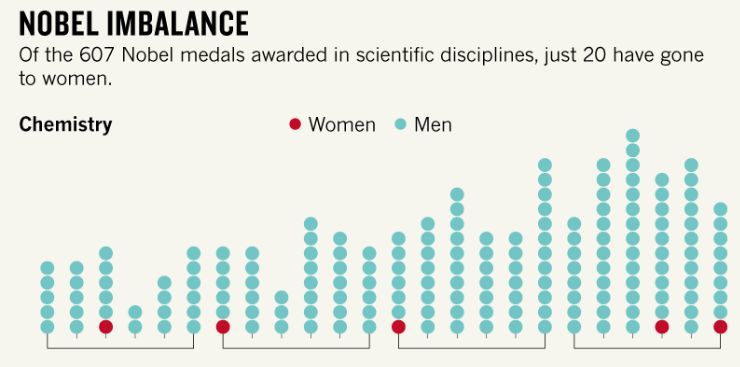


By Steve Sailer
10/07/2019

The three hard science Nobel Prizes — Physics, Chemistry, and Medicine/Physiology — have been impressively resistant to the demands of the cult of diversity. Women have made up only 20 of the 607 winners, and I don’t believe there’s ever been a black winner in the hard sciences.
But all good things must come to an end. From Nature:
‘More women are being nominated’: Nobel academy head discusses diversity
04 OCTOBER 2019
Ahead of this year’s award announcements, Göran Hansson speaks about measures to address the imbalance in gender and ethnicity among winners.
by Elizabeth GibneyNext week, the Royal Swedish Academy of Sciences will award the first Nobel prizes in chemistry and physics after making tweaks to its nomination procedure to diversify the pool of potential winners.
The academy acknowledged last year that women and scientists from some ethnic groups are under-represented among Nobel laureates. Wins in 2018 for Donna Strickland in physics and Frances Arnold in chemistry were welcomed, but did little to move the needle (see ‘Nobel imbalance’).
The organization introduced measures that it hoped would tackle the issue by encouraging scientists to put forward a more diverse range of nominees. These included asking more women to suggest candidates, and altering the wording of the letter inviting nominations. The new language explicitly asks nominators to consider diversity in gender, geography and topic, as well as to nominate more than one discovery.
Nature spoke to the academy’s secretary-general, biomedical scientist Göran Hansson, to see what impact the measures have had.
Did the changes you introduced to the letter make a difference?
We’ve gone through the nominations and although I cannot give you any exact figures, it looks like there is a positive trend, with more women being nominated. It’s small, but it’s a trend. We will follow this very carefully for several years to see if there is statistical significance before we draw any firm conclusions. But it looks like we may be on the right track. With time, there will also be a gradual change in the population of scientists who are potential candidates, so that will help too.
Did increasing the proportion of women among the nominators help?
That did not seem to have any impact, unfortunately. Women are no more likely to nominate women than men are, that’s the conclusion. That’s something we will follow up, but that’s how it looks at the moment.
In other words, they asked a bunch of distinguished women scientists to nominate Nobel Laureates and the women scientists came up with the same gender gap in achievement as the distinguished men scientists. It’s almost as if real scientists, male and female, often don’t actually believe what the Angela Saini-type journalists tell them about scientists.
… Are you trying to boost diversity beyond gender?
Yes. In the nomination letter we also mentioned ethnicity. We cannot say yet whether it has had any effect, because we started by evaluating gender. But even before we changed the nomination letter, one of the countries that had increased its number of Nobel laureates the most was Japan. So that augurs against any bias towards what the Americans call Caucasians. We see enormous investments in science now in East Asia, and we see more people from East Asia being nominated than ever before. So long-term, I’m sure that will pay off.But we have a balance to strike here. Alfred Nobel explicitly stated that we should not consider nationality when we award the prize. He wrote in his will that the most worthy individual shall receive the prize, irrespective of whether they are Scandinavian or not. So we will never introduce quotas for nations, ethnicity or, for that matter, gender.
As the Supreme Court ruled in the 1978 Bakke decision: Quotas are unconstitutional. Goals, however, are swell.
But, in new news, the Nobel folks just gave the Medicine prize to 3 white dudes:
BREAKING NEWS:
— The Nobel Prize (@NobelPrize) October 7, 2019
The 2019 #NobelPrize in Physiology or Medicine has been awarded jointly to William G. Kaelin Jr, Sir Peter J. Ratcliffe and Gregg L. Semenza “for their discoveries of how cells sense and adapt to oxygen availability.” pic.twitter.com/6m2LJclOoL
White men continue to oppress women and people of color by making major scientific discoveries with profound implications for improving health.
#NobelsSoWhite